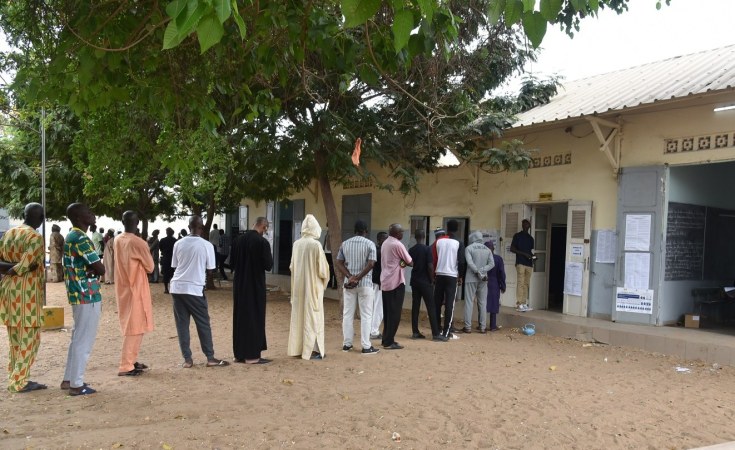Senegal's President Bassirou Diomaye Faye unexpectedly called a snap legislative election which was held on 17 November. Faye was sworn in as president in April after a tumultuous period, triggered when former president Macky Sall postponed a scheduled presidential election. Mass protests followed, exposing the fragility of Senegal's democratic institutions. Sall eventually reversed his stance and elections followed. With the snap legislative election concluded, political scientist Amaka Emordi takes the temperature in the country.
How important are these elections? Is democracy secure in Senegal?
The recent electoral transition in Senegal and the legislative election reflect the critical importance of upholding democratic principles and the rule of law. Sall's decision to forgo an unconstitutional third term bid in July 2023, followed by the election of opposition candidate Bassirou Diomaye Faye, exemplified the resilience of Senegal's democracy.
This transition, characterised by high voter participation and peaceful elections, illustrated the nation's commitment to constitutional governance.
Ahead of the 17 November legislative election, Faye promised it would be free, democratic and transparent. Although final results are yet to be announced, the ruling party, Pastef, appears poised to win a majority of the legislative seats.
Senegal's main opposition leaders, including former president Sall, conceded defeat and congratulated Faye and the ruling party. The legislative election signposts the citizens' resolve to institutionalise democratic institutions and principles in Senegal.
The country's leaders chose the route of "change through the ballot". They recognised that elections offer citizens a peaceful, legal way to influence their leadership and government.
This was of great importance for a country that experienced widespread protests and violence after the president's initial decision to postpone the election indefinitely.
Senegal's election reinforced the strength of its democratic institutions.
Civil unrest had occurred largely due to legal issues involving opposition leader Ousmane Sonko. His supporters -- primarily disillusioned young people facing economic hardship -- staged protests.
The government faced pressure to uphold democratic principles.
The election of Faye marked a peaceful shift of power, demonstrating the effectiveness of democratic processes in achieving political transitions.
With a high voter turnout of 61.3%, the presidential election election emphasised Senegal's commitment to constitutional democracy.
Events in Senegal contrast with other African nations like Equatorial Guinea and Cameroon that are grappling with democratic instability.
What are the biggest threats to democracy in Senegal?
The challenges facing Senegal's institutions include weak governance, corruption and state capture.
Senegal fares better on corruption indices than its west African peers. Yet clientelism, nepotism and administrative corruption were evident during the administrations of Abdoulaye Wade and Sall.
These weaknesses hinder public service delivery, undermine term limits and contribute to political and economic instability.
The resulting problems include democratic tensions and shortsighted decision-making.
Faye has committed to breaking with past practices and governing with transparency.
Across Africa, the desire for democratic progress has resonated with many nations, including Cape Verde, South Africa, Namibia, Rwanda and Liberia.
The importance of elections is supported by international organisations like the African Union, through initiatives like the African Charter on Democracy, Elections, and Governance.
But, in many countries, corruption, election manipulation and entrenched power structures all undermine democratic intentions. Challenges to democracy in Africa include:
- frail and weak democratic institutions
- pervasive corruption
- state capture
- undermined term limits
- issues of political culture - shared beliefs, feelings and values held by a population regarding its country's political system
- economic instability
- structural problems to do with weak civil society, a weak economy, a lack of credible opposition and recurring military intervention, among other issues.
Senegal has maintained stability through regular elections, peaceful transitions of power, and a strong constitutional framework.
This stability has helped Senegal avoid military coups and significant political unrest. Its democracy is built on social consensus, respecting communal and religious diversity.
What will ensure Senegal's democracy remains resilient?
The state must avoid pitfalls like ignoring ignore term limits, restricting citizens' political participation and making unconstitutional reforms.
Respecting democratic principles is essential for maintaining trust in government institutions and preserving the country's democratic integrity.
These global best practices will consolidate constitutional democracy in Senegal.
- Inclusive governance and participation: This means that a variety of stakeholders must actively participate in decision-making procedures.
- Rule of law and judicial independence: Strong legal foundations, protecting judicial appointments from political influence, and improving legal education and training for judges and other legal professionals are examples of best practices. An example in this regard is Botswana.
- Electoral integrity and accountability: Consolidating democracy requires free and fair elections. Ghana's electoral system is a good example because it has a history of peaceful handovers of power and independent electoral commissions.
- Combating corruption: Corruption weakens institutions and erodes public trust. It poses a serious threat to constitutional democracy.
- Media freedom and access to information: Free and unbiased media are important to keep governments in check and encourage discussions among the public.
- Education and civic engagement: Education is important for democracy because it helps people understand their rights and duties as citizens. Ghana has been doing a good job of teaching people about politics and civic duties in schools and communities. Countries like Chad, where people aren't well-educated or involved in civic activities, struggle more with democracy.
What lessons can Senegal offer?
The election of opposition candidate Faye, as well as the recently concluded snap legislative polls, marked a peaceful transition of power. It showed how democratic processes can bring about meaningful political change.
Faye's victory was all the more remarkable because of a strong voter turnout of 61.3%.
In my view this showed the deep engagement of Senegalese citizens in the democratic process, and the integrity of the electoral process. This is despite the challenges posed by prior civil unrest involving Ousmane Sonko.
Amaka Emordi, Lecturer, Political Science, Obafemi Awolowo University


